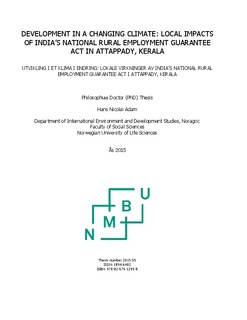| dc.contributor.advisor | Kjosavik, Darley Jose | |
| dc.contributor.advisor | Shanmugaratnam, Nadarajah | |
| dc.contributor.author | Adam, Hans Nicolai | |
| dc.date.accessioned | 2017-07-05T08:49:56Z | |
| dc.date.available | 2017-07-05T08:49:56Z | |
| dc.date.issued | 2017-07-05 | |
| dc.identifier.isbn | 978-82-575-1295-8 | |
| dc.identifier.issn | 1894-6402 | |
| dc.identifier.uri | http://hdl.handle.net/11250/2447864 | |
| dc.description.abstract | The thesis analyses the role of one of India’s central social security schemes, the Mahatma Gandhi National Rural Employment Guarantee Act (MGNREGA), in the context of climate change adaptation. A conceptual exploration and empirical analysis form the core parts of this multi-scalar study. The conceptual part explores it from the perspective of a mainstreamed, climate change adaptation policy and the empirical parts draw on data from the local level to examine its developmental effects, relevance, opportunities and limitations in this regard. A tribal development Block (Attappady) located in the south Indian state of Kerala, is the field study area and provides the core of empirical data. Located within a wider political economy frame, theoretical insights from social protection, vulnerability and adaptation thinking inform the research framework. This study shows that the MGNREGA is a relevant tool as part of India’s climate change adaptation policy and an important instrument to address proximate vulnerability patterns of its rural population. Research findings from Attappady also highlight shortcomings and limitations. Underlying structural factors continue to undermine the scheme’s efficaciousness and the potential for political misuse exists. While the argument of creating sustainable livelihoods through the MGNREGA cannot be supported and its most positive effects can be discerned by way of it providing a coping mechanism, albeit with limited build-up of adaptive capacities. Vulnerable and marginal population sections in Attappady are the prime beneficiaries with social outcomes being prioritised while physical productivity is a neglected aspect of the scheme. In order to exploit its potential as a tool for climate change adaptation, the MGNREGA needs to be reformed to explicitly acknowledge climate change adaptation concerns. Ultimately, the scheme can only be a constituent part in a wider process of change that addresses structural causes of vulnerability and factors that cause and contribute to anthropogenic climatic changes. | nb_NO |
| dc.description.abstract | Denne avhandlingen tar for seg et av Indias viktigste velferdsprogram, Mahatma Gandhi National Rural Employment Guarantee Act (MGNREGA), og dets rolle i lys av tilpasninger til
klimaendringer. En konseptuell utforskning og empirisk analyse utgjør hoveddelene av denne flernivåanalysen. Den konseptuelle delen undersøker MGNREGA fra et klimatilpasningspolitisk
perspektiv, mens den empiriske delen baserer seg på data fra lokalt nivå for å kunne studere programmets utviklingseffekter, relevans, muligheter og begrenseringer. Avhandlingens empiriske materiale er hentet fra Attappady, en ”tribal development Block” i delstaten Kerala i det sørlige India. Forskningens rammeverk henter teoretisk innsikt fra relevant litteratur om sosial trygghet, sårbarhet, og tilpasning. Avhandlingens analyser viser at MGNREGA er et relevant verktøy i Indias klimatilpasningspolitikk og er et viktig instrument for å ta tak i
landsbygdbefolkningens sårbarhet. Forskningens funn fra Attappady peker også på programmets
tilkortkommenhet og begrensninger. Underliggende strukturelle forhold fortsetter å undergrave
programmets virksomhet, samtidig som mulighetene for politisk misbruk er tilstede. Denne
forskningen gir ikke støtte til tanken om at bærekraftige leveveier kan skapes gjennom MGNREGA, mens det mest positive bidraget er muligheten for at programmet tilbyr en mulighet for mestring, om enn med begrensede muligheter for styrking av tilpasningsevnen. Sårbare deler av befolkningen i Attappady er MGNREGAs hovedmålgruppe, og der programmets sosiale effekter er sterk vektlagt, er hensyn til fysisk verdiskaping et mer forsømt område. For å få utnyttet dets potensiale som et verktøy for klimatilpasning, må MGNREGA endres slik at det eksplisitt tar inn over seg klimatilpasningshensyn. I det lange løp vil programmet kun være ett bidrag i en bredere endringsprosess som tar tak i de strukturelle årsakene til sårbarhet og faktorene som bidrar til menneskeskapte klimaendringer. | nb_NO |
| dc.language.iso | eng | nb_NO |
| dc.publisher | Norwegian University of Life Sciences, Ås | |
| dc.relation.ispartofseries | PhD Thesis;2015:55 | |
| dc.title | Development in a changing climate : local impacts of India's National Rural Employment Guarantee Act in Attappady, Kerala | nb_NO |
| dc.title.alternative | Utvikling i et klima i endring : lokale virkninger av India's national rural employment guarantee act i Attappady, Kerala | nb_NO |
| dc.type | Doctoral thesis | nb_NO |
| dc.source.pagenumber | 1 b. (flere pag.) | nb_NO |
